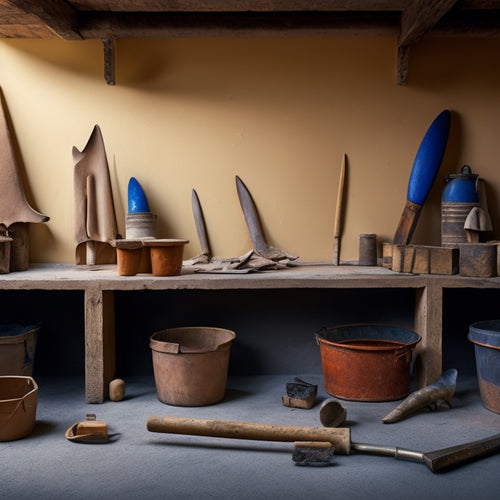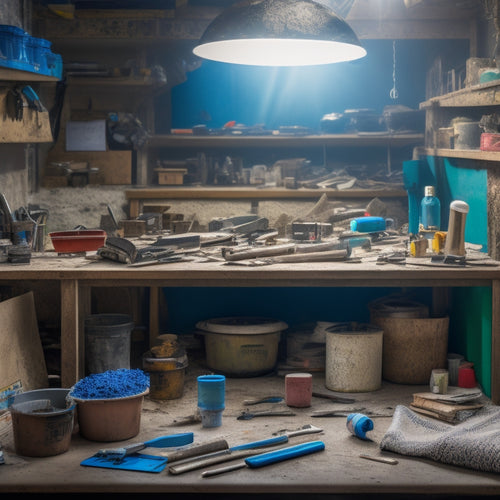
3 Best Concrete Cutting Tools for Renovation Success
Share
You'll need the right concrete cutting tools to achieve a successful renovation, and that starts with selecting the best saws, drills, and grinders for the job. Concrete saws, like walk-behind or handheld models, are vital for cutting through thick slabs, while concrete drilling machines provide the high torque and variable speed control needed for precise hole drilling. Meanwhile, concrete grinding tools, such as diamond grinders, help refine surfaces for a smooth finish. To guarantee a seamless renovation, it's essential to choose the right tools for your specific project needs - and understanding their unique features and benefits is key to revealing a professional-grade result.
Key Takeaways
• Walk-behind concrete saws are ideal for large-scale projects, offering high productivity and efficiency in cutting through thick concrete slabs.
• Handheld concrete saws are better suited for smaller tasks, providing precision and control for intricate cuts and curved lines.
• Diamond blades are a top choice for concrete cutting, offering superior durability and performance compared to abrasive blades.
• Wet cutting with a concrete saw reduces dust and heat, making it a safer and more environmentally friendly option for renovation projects.
• Safety guidelines, including protective gear and a clean work area, are essential when operating concrete cutting tools to minimize risks and ensure success.
Top Concrete Saws for Renovation
When tackling a renovation project, you'll need a reliable concrete saw to efficiently cut through concrete, asphalt, or masonry. The right tool can make all the difference regarding speed, accuracy, and safety.
There are several concrete saw types to choose from, including walk-behind saws, handheld saws, and ring saws. Each type is designed for specific tasks and has its own advantages. For instance, walk-behind saws are ideal for large-scale projects, while handheld saws are better suited for smaller tasks.
When selecting a concrete saw, consider the blade material options. Diamond blades are a popular choice because they're durable and effective at cutting through hard materials. Abrasive blades, on the other hand, are more affordable but may wear out faster.
You'll also need to decide between wet or dry cutting. Wet cutting reduces dust and heat buildup, but dry cutting is more convenient. Regardless of your choice, make sure you follow safety guidelines, such as wearing protective gear and keeping the work area clean.
Best Concrete Drilling Machines
After efficiently cutting through concrete with the right saw, you'll likely need to drill into the material to anchor fixtures, install pipes, or run cables. This makes a reliable concrete drilling machine an essential addition to your renovation toolkit.
When choosing a concrete drilling machine, consider the following key features:
-
Power and speed: Look for machines with high torque and variable speed control to tackle tough concrete cores.
-
Diamond bits: Verify the machine is compatible with high-quality diamond bits, which are designed for efficient and safe drilling.
-
Safety features: Opt for machines with built-in safety features, such as overload protection and ergonomic design, to minimize the risk of accidents.
A good concrete drilling machine will help you drill precise holes and reduce the risk of damage to the surrounding concrete.
With the right machine and diamond bits, you'll be able to efficiently drill through concrete, making it easier to complete your renovation project on time and within budget.
Efficient Concrete Grinding Tools
With the drilling process complete, you're now ready to turn your attention to refining the concrete surface using efficient concrete grinding tools. This critical step in surface preparation guarantees a smooth, even finish, and it's crucial to get it right.
Diamond grinding is a popular method for concrete grinding, as it uses diamond-impregnated abrasives to effectively remove imperfections and leave a high-gloss finish. When selecting a concrete grinder, consider the size of the area you need to cover, as well as the level of aggression required. For larger areas, a walk-behind grinder may be the best option, while handheld grinders are better suited for smaller, more intricate areas.
Regardless of the tool you choose, always follow safety guidelines, including wearing protective gear, such as gloves and safety glasses, and guaranteeing proper ventilation to minimize dust exposure.
Frequently Asked Questions
What Safety Gear Is Essential for Concrete Cutting and Grinding Tasks?
When you're about to cut or grind concrete, you're not just handling tools, you're handling hazards.
You must prioritize safety by wearing essential protective equipment. This includes safety glasses, gloves, earplugs, and a dust mask to prevent airborne silica exposure.
Ascertain you meet strict safety standards by wearing long sleeves, pants, and steel-toed boots.
Don't compromise - follow guidelines to minimize risks and ascertain a safe working environment.
Can I Cut Concrete With a Regular Circular Saw or Miter Saw?
You're wondering if a regular circular saw or miter saw can cut concrete. The short answer is no, you shouldn't. These saws aren't designed for concrete cutting and can be dangerous.
Instead, invest in a concrete saw specifically designed for the task. Look for saws with diamond-coated blades or abrasive blades, which are suited for concrete cutting.
These blades are designed to handle the high friction and heat generated when cutting concrete, ensuring a safer and more efficient process.
How Do I Minimize Dust When Cutting or Grinding Concrete?
Did you know that inhaling concrete dust can cause serious respiratory issues, with the Occupational Safety and Health Administration (OSHA) reporting that 1 in 5 construction workers suffer from silica-related diseases?
To minimize dust when cutting or grinding concrete, you'll want to implement dust control methods. Consider using wet cutting techniques, like a diamond blade saw or grinder with a water supply, to reduce airborne particles.
Always wear personal protective equipment, including a respirator, and guarantee proper ventilation to prioritize your safety.
What Is the Best Way to Clean and Maintain Concrete Cutting Tools?
When it comes to cleaning and maintaining your concrete cutting tools, you'll want to establish a regular maintenance schedule to guarantee peak performance and extend their lifespan.
Start by cleaning tools thoroughly after each use, removing any concrete residue and debris.
Store tools in a dry, protected area, utilizing tool storage solutions like cases or chests to prevent damage.
Regularly inspect and sharpen blades, and lubricate moving parts to keep your tools in top condition.
Are There Any Specific Regulations for Concrete Cutting in Residential Areas?
You think you're all set to start cutting concrete in your residential area, but hold on, friend!
You wouldn't want to wake up the whole neighborhood, or worse, get fined. Check your local zoning laws and noise restrictions before firing up those cutting tools.
You'll need to guarantee you're operating within the allowed decibel levels and permitted work hours to avoid any, ahem, 'concrete' issues with the authorities.
Conclusion
You've got the right tools to tackle that renovation project.
With high-quality concrete saws, drilling machines, and grinding tools, you'll be able to cut, drill, and smooth concrete with ease.
Did you know that the global concrete cutting equipment market is projected to reach $1.4 billion by 2025? This growing demand highlights the importance of having the best tools for the job.
By investing in quality concrete cutting tools, you'll guarantee a successful renovation and stay ahead of the competition.
Related Posts
-

Streamlining Your Exterior Renovation Timeline
To streamline your exterior renovation timeline, start by identifying your project goals and objectives, and prioriti...
-

7 Best Plastering Bat Sizes for DIY Renovations
When tackling DIY renovations, you'll want to choose the right plastering bat size to achieve a professional-looking ...
-

Get Discounted Plastering Tool Sets for DIY Renovations
You can find discounted plastering tool sets online, at local hardware stores, and thrift stores, offering a range of...


